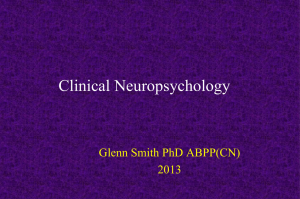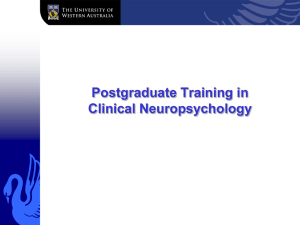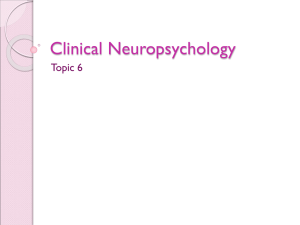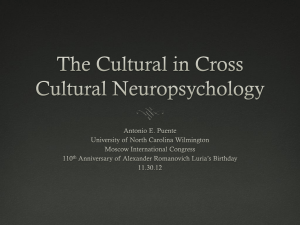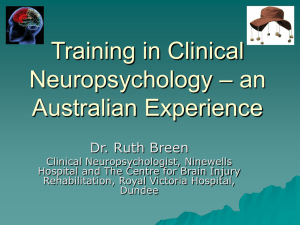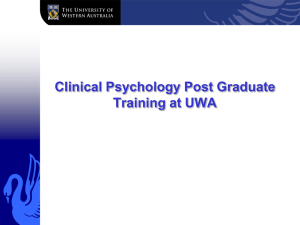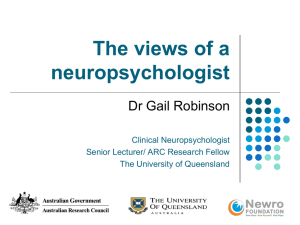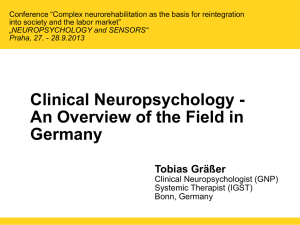General Practice Ethics American Psychological Association. (2010
advertisement
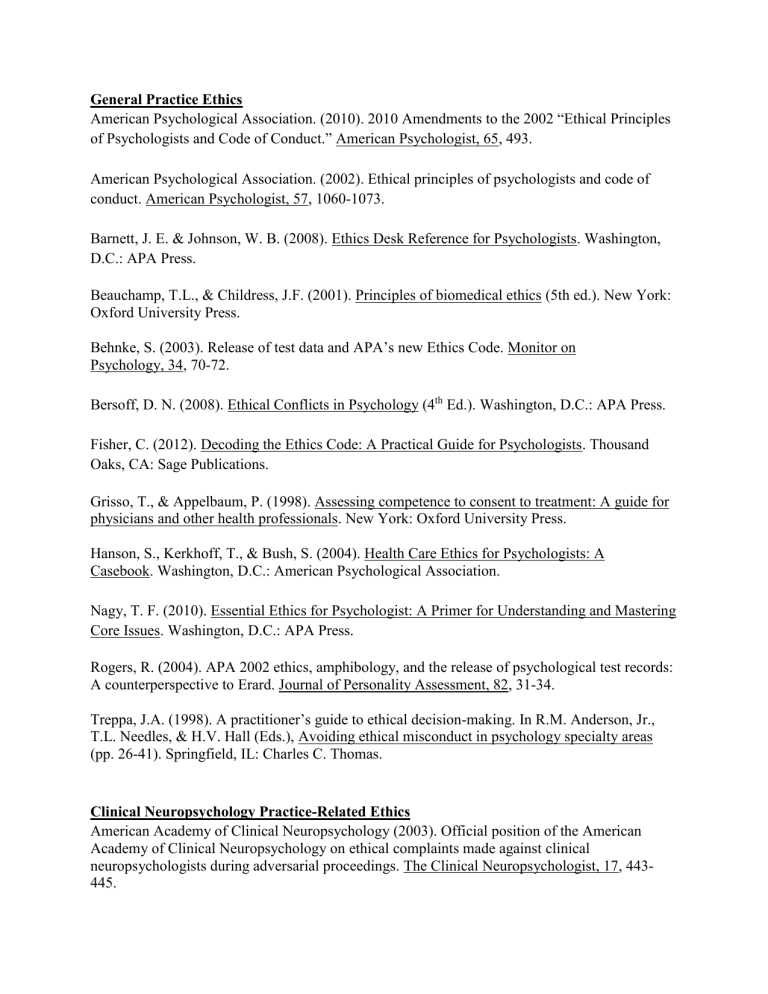
General Practice Ethics American Psychological Association. (2010). 2010 Amendments to the 2002 “Ethical Principles of Psychologists and Code of Conduct.” American Psychologist, 65, 493. American Psychological Association. (2002). Ethical principles of psychologists and code of conduct. American Psychologist, 57, 1060-1073. Barnett, J. E. & Johnson, W. B. (2008). Ethics Desk Reference for Psychologists. Washington, D.C.: APA Press. Beauchamp, T.L., & Childress, J.F. (2001). Principles of biomedical ethics (5th ed.). New York: Oxford University Press. Behnke, S. (2003). Release of test data and APA’s new Ethics Code. Monitor on Psychology, 34, 70-72. Bersoff, D. N. (2008). Ethical Conflicts in Psychology (4th Ed.). Washington, D.C.: APA Press. Fisher, C. (2012). Decoding the Ethics Code: A Practical Guide for Psychologists. Thousand Oaks, CA: Sage Publications. Grisso, T., & Appelbaum, P. (1998). Assessing competence to consent to treatment: A guide for physicians and other health professionals. New York: Oxford University Press. Hanson, S., Kerkhoff, T., & Bush, S. (2004). Health Care Ethics for Psychologists: A Casebook. Washington, D.C.: American Psychological Association. Nagy, T. F. (2010). Essential Ethics for Psychologist: A Primer for Understanding and Mastering Core Issues. Washington, D.C.: APA Press. Rogers, R. (2004). APA 2002 ethics, amphibology, and the release of psychological test records: A counterperspective to Erard. Journal of Personality Assessment, 82, 31-34. Treppa, J.A. (1998). A practitioner’s guide to ethical decision-making. In R.M. Anderson, Jr., T.L. Needles, & H.V. Hall (Eds.), Avoiding ethical misconduct in psychology specialty areas (pp. 26-41). Springfield, IL: Charles C. Thomas. Clinical Neuropsychology Practice-Related Ethics American Academy of Clinical Neuropsychology (2003). Official position of the American Academy of Clinical Neuropsychology on ethical complaints made against clinical neuropsychologists during adversarial proceedings. The Clinical Neuropsychologist, 17, 443445. Anderson, R. M. Jr., & Shields, H. (1998). Ethical issues in neuropsychological assessment. In R. M. Anderson, Jr., T. L. Needels, & H. V. Hall (Eds.), Avoiding ethical misconduct in psychology specialty areas (pp. 131-141). Springfield, IL: Charles C. Thomas Publisher. Arribas-Ayllon, M. (2011). The ethics of disclosing genetic diagnosis for Alzheimer’s disease: Do we need a new paradigm? British Medical Bulletin, 1-15. Binder, L.M., & Thompson, L.L. (1995). The ethics code and neuropsychological assessment practices. Archives of Clinical Neuropsychology, 10, 27-46. Brittain, J.L., Frances, J.P., & Barth, J.T. (1995). Ethical issues and dilemmas in neuropsychological practice reported by ABCN diplomates. Advances in Medical Psychotherapy, 8, 1-22. Bush, S.S., & Drexler, M.L. (Eds.) (2002). Ethical Issues in Clinical Neuropsychology. Lisse, NL: Swets & Zeitlinger Publishers. Bush, S.S. (Ed.) (2005). A casebook of ethical challenges in neuropsychology. New York: Psychology Press. Bush, S.S., & Martin, T.A. (2005). Ethical issues in geriatric neuropsychology. In S.S. Bush & T.A. Martin (Eds.), Geriatric neuropsychology: Practice essentials (pp. 507-536). New York: Psychology Press. Bush, S.S., & Martin, T.A. (2006). Introduction to ethical controversies in neuropsychology. Applied Neuropsychology, 13, 63-67. Bush, S. S. (2007). Ethical Decision Making in Clinical Neuropsychology. New York: Oxford Press. Bush, S.S., Grote, C., Johnson-Greene, D., & Macartney-Filgate, M. (2008). A panel interview on the ethical practice of neuropsychology. The Clinical Neuropsychologist, 22, 321-344. Bush, S.S., & Martin, T.A. (2008). Confidentiality in neuropsychological practice. In A.M. Horton, Jr. & D. Wedding (Eds.), The Neuropsychology Handbook, 3rd Edition (pp. 517-532). New York: Springer Publishing Co. Fisher, J.M., Johnson-Greene, D., & Barth, J.T. (2002). Examination, diagnosis, and interventions in clinical neuropsychology in general and with special populations: An overview. In S.S. Bush & M.L. Drexler (Eds.), Ethical issues in clinical neuropsychology (pp. 3-22). Lisse, NL: Swets & Zeitlinger Publishers. Grote, C. L., Lewin, J. L., Sweet, J. J., & van Gorp, W. G. (2000). Responses to Perceived Unethical Practices in Clinical Neuropsychology: Ethical and Legal Considerations. The Clinical Neuropsychologist, 14, 119-134. Porteri C, Galluzzi S, Geroldi C, Frisoni GB. (2010). Diagnosis disclosure of progromal Alzheimer disease-ethical analysis of two cases. Canadian Journal of Neurological Science, 37, 67-75. Thompson, L.L. (2002). Ethical issues in interpreting and explaining neuropsychological assessment results. In S.S. Bush & M.L. Drexler (Eds.), Ethical Issues in Clinical Neuropsychology (pp. 51-72). Lisse, NL: Swets & Zeitlinger Publishers. Wong, T.M. (2006). Ethical controversies in neuropsychological test selection, administration, and interpretation. Applied Neuropsychology, 13, 68-76. Woody, R. H. (1989). Public policy and legal issues for clinical child neuropsychology. In C.R. Reynolds & E. Fletcher-Janzen (Eds), Handbook of Clinical Child Neuropsychology (pp. 573583). New York: Plenum Press. Woody, R. H. (1997). Psycholegal issues for clinical child neuropsychology. In C.R. Reynolds & E. Fletcher-Janzen (Eds), Handbook of Clinical Child Neuropsychology, 2nd edition (pp. 712725). New York: Plenum Press Data Disclosures Attix, D.K., Donders, J., Johnson-Greene, D., Grote, C.L., Harris, J.G., & Bauer, R.M. (2007). Disclosure of neuropsychological test data: Official position of Division 40 (Clinical Neuropsychology) of the American Psychological Association, Association of Postdoctoral Programs in Clinical Neuropsychology, and American Academy of Clinical Neuropsychology. The Clinical Neuropsychologist, 21, 232-238. Bush, S.S., & Martin, T.A. (2006). The ethical and clinical practice of disclosing raw test data: Addressing the ongoing debate. Applied Neuropsychology, 13, 125-136. Lees-Haley, P.R., & Courtney, J.C. (2000). Disclosure of tests and raw test data to the courts: A need for reform. Neuropsychology Review, 10, 169-175. National Academy of Neuropsychology (2000). Test security: Official statement of the National Academy of Neuropsychology. Archives of Clinical Neuropsychology, 15, 383-386. National Academy of Neuropsychology (2003). Test Security: An Update. https://www.nanonline.org/docs/PAIC/PDFs/NANTestSecurityUpdate.pdf National Academy of Neuropsychology Policy and Planning Committee (2000). Handling requests to release test data, recording and/or reproductions of test data. Official statement of the National Academy of Neuropsychology. http://www.nanonline.org/paio/secappend.shtm Naugle, R.I. & McSweeny, A.J. (1995). On the practice of routinely appending neuropsychological data to reports, The Clinical Neuropsychologist, 9, 245-247. Naugle, R.I. & McSweeny, A.J. (1996). More thoughts on the practice of routinely appending raw data to reports: Response to Freides and Matarazzo. The Clinical Neuropsychologist, 10, 313-314. Psychological Corporation. (2004). Releasing test materials: Position of the Psychological Corporation. Bulletin of the National Academy of Neuropsychology, 19, 1-8. Rapp, D.L. Ferber, P.S., & Bush, S.S. (2008). Unresolved issues about release of test data and test materials. In A.M. Horton, Jr. & D. Wedding (Eds.), The Neuropsychology Handbook, 3rd Edition (pp. 471-500). New York: Springer Publishing Co. Shapiro, D.L. (2000). Commentary: Disclosure of tests and raw data to the courts. Neuropsychology Review, 10, 175-176. Forensic Issues Ameis, A., Zasler, N.D., Martelli, M.F., & Bush, S.S. (2006). Ethical issues in clinicolegal practice. In N.D. Zasler, D. Katz, & R. Zafonte (Eds.), Brain Injury Medicine: Principles and Practice (pp. 1163-1182). New York: Demos Medical Publishing. American Bar Association/American Psychological Association Assessment of Capacity in Older Adults Project Working Group. (2008). Assessment of older adults with diminished capacity: A handbook for Psychologists. Washington, DC: American Bar Association Commission on Law and Aging-American Psychological Association. American Psychological Association (2012). Specialty guidelines for forensic psychology. Retrieved from: http://www.apa.org/practice/guidelines/forensic-psychology.pdf Bush, S.S. (2005). Introduction to Ethical Issues in Forensic Neuropsychology. Journal of Forensic Neuropsychology, 4, 1-9. Bush, S.S., Barth, J.T., Pliskin, N.H., Arffa, S., Axelrod, B.N., Blackburn, L. A., Faust, D., Fisher, J.M., Harley, J.P., Heilbronner, R.L., Larrabee, G.J., Ricker, J.H., & Silver, C.H. (National Academy of Neuropsychology Policy & Planning Committee) (2005). Independent and court-ordered forensic neuropsychological examinations: Official statement of the National Academy of Neuropsychology. Archives of Clinical Neuropsychology, 20, 997-1007. http://www.nanonline.org/paio/IME.shtm Bush, S.S. (2005). Ethical challenges in forensic neuropsychology: Introduction. In S.S. Bush (Ed.), A casebook of ethical challenges in neuropsychology (pp. 10-14). New York: Psychology Press. Bush, S.S., & Lees-Haley, P.R. (2005). Threats to the validity of forensic neuropsychological data: Ethical considerations. Journal of Forensic Neuropsychology, 4, 45-66. Bush, S.S., Connell, M.A., & Denney, R.L. (2006). Ethical practice in forensic psychology: A systematic model for decision making. Washington, D.C.: American Psychological Association. Committee on Ethical Guidelines for Forensic Psychologists (1991). Specialty guidelines for forensic psychologists. Law and Human Behavior, 15, 655-665. Committee on the Revision of the Specialty Guidelines for Forensic Psychology. (2008). Specialty guidelines for forensic psychology, 3rd draft. Retrieved from www.apls.org/links/22808sgfp.pdf. Connell, M., & Koocher, G.P. (2003). HIPAA and forensic practice. American Psychology Law Society News, 23, 16-19. Crown, B.M., Fingerhut, H.S., & Lowenthal, S.J. (2003). Conflicts of interest and other pitfalls for the expert witness. In In A.M. Horton, Jr. & L.C. Hartlage (Eds.), Handbook of forensic neuropsychology (pp. 383-421). New York: Springer Publishing Company. Demakis, G. J. (2012). Civil capacities in clinical neuropsychology: Research findings and practical applications. New York: Oxford. Denney, R. L. (2008). A final word on authentic professional competence in criminal forensic neuropsychology. In R. L. Denney & J. P. Sullivan (Eds.) Clinical Neuropsychology in the Criminal Forensic Setting. New York: Guilford. Division 40 of the American Psychological Association (1989). Definition of a clinical neuropsychologist. The Clinical Neuropsychologist, 3, 22. Greenberg, S., & Shuman, D. (1997). Irreconcilable conflict between therapeutic and forensic roles. Professional Psychology: Research and Practice, 28, 50-57. Greenberg, L.R., & Gould, J.W. (2001). The treating expert: A hybrid role with firm boundaries. Professional Psychology: Research and Practice, 32, 469-478. Grote, C.L. (2005). Ethical practice of forensic neuropsychology. In G.J. Larrabee (Ed.), Forensic neuropsychology: A scientific approach (92-114). New York: Oxford University Press. Grote, C.L., & Parsons, T.D. (2005). Threats to the livelihood of the forensic neuropsychological practice: Avoiding ethical misconduct. Journal of Forensic Neuropsychology, 4, 79-93. Guilmette, T.J., & Hagan, L.D. (1997). Ethical considerations in forensic neuro-psychological consultation. The Clinical Neuropsychologist, 11, 287-290. Hartlage, L.C. (2003). Neuropsychology in the courtroom. In A.M. Horton, Jr. & L.C. Hartlage (Eds.), Handbook of forensic neuropsychology (pp. 315-333). New York: Springer Publishing Company. Heilbrun, K. (2001). Principles of forensic mental health assessment. New York: Kluwer Academic/Plenum Publishers. Iverson, G.L. (2000). Dual relationships in psycholegal evaluations: Treating psychologists service as expert witnesses. American Journal of Forensic Psychology, 18, 79-87. Johnson-Greene, D., & Bechtold, K.T. (2002). Ethical considerations for peer review in forensic neuropsychology. The Clinical Neuropsychologist, 16, 97-104. Kaufmann, P.M. (2005). Protecting the objectivity, fairness, and integrity of neuropsychological evaluations in litigation: A privilege second to none? Journal of Legal Medicine, 26, 95-131. Lees-Haley, P.R., & Cohen, L.J. (1999). The neuropsychologist as expert witness: Toward credible science in the courtroom. In J.J. Sweet (Ed.), Forensic neuropsychology: Fundamentals and practice (pp. 443-468). Lisse, NL: Swets & Zeitlinger Publishers. Macartney-Filgate, M.S., & Snow, W.G. (2004). The practitioner as expert witness. In. D.R. Evans(Ed.). The law, standards, and ethics in the practice of psychology (2nd ed.). Toronto, Canada: Emond Montgomery Publishers. Malina, A.C., Nelson, N.W., & Sweet, J.J. (2005). Framing the relationships in forensic neuropsychology: Ethical issues. Journal of Forensic Neuropsychology, 4, 21-44. Martelli, M., Zasler, N., & Grayon, R. (1999). Ethical considerations in medicolegal evaluations of neurologic injury and impairment following acquired brain injury. NeuroRehabilitation: An Interdisciplinary Journal, 13, 45-66. Martelli, M.F., Zasler, N.D. & Grayson, R. (1999). Ethical considerations in impairment and disability evaluations following acquired brain injury. In R.V. May & M.F. Martelli (Eds), Guide to Functional Capacity Evaluation with Impairment Rating Applications. Richmond: NADEP Publications. Martelli, M.F., & Zasler, N.D. (2001). Promoting ethics and objectivity in medicolegal contexts: Recommendations for experts. In R.B. Weiner (Ed.): Pain management: A practical guide for clinicians (6th ed.) (pp. 895-907). Boca Raton, FL: St. Lucie Press. Martelli, M.F., Zasler, N.D., & Johnson-Greene, D. (2001). Promoting ethical and objective practice in the medicolegal arena of disability evaluation. In R.D. Rondinelli & R.T. Katz (Eds.), Disability Evaluation. Physical Medicine and Rehabilitation Clinics of North America, 12, 571584. Philadelphia: W.B. Saunders. Martelli, M.F., Bush, S.S., & Zasler, N.D. (2003). Identifying, avoiding, and addressing ethical misconduct in neuropsychological medicolegal practice. International Journal of Forensic Psychology, 1, 26-44. Melton, G., Petrila,, J., Poythress, N., & Slobogin, C., Lyons, P., & Otto, R. K. (2007). Psychological evaluations for the courts: A handbook for mental health professionals and lawyers (third edition). New York: Guilford. Morgan, J.E., & Bush, S.S. (2005). Anticipating forensic involvement: Ethical considerations for clinical neuropsychologists. Journal of Forensic Neuropsychology, 4, 11-20. National Academy of Neuropsychology. (2003). Independent and Court-Ordered Forensic Neuropsychological Examinations. https://www.nanonline.org/docs/PAIC/PDFs/NANIMEpaper.pdf Simon, R.I. (1996). Legal and ethical issues. In J.R. Rundell et al. (Eds.), The American Psychiatric Press Textbook of Consultation-Liaison Psychiatry. Washington, D.C.: American Psychiatric Press, Inc. Slick, D.J., & Iverson, G.L. (2003). Ethical issues in forensic neuropsychological assessment. In I.Z. Schultz & D.O. Brady (Eds.), Psychological injuries at trial, (pp. 2014-2034). Chicago: American Bar Association. Strasburger, H., Gutheil, T., & Brodsky, B. (1997). On wearing two hats: Role conflict in serving as both psychotherapist and expert witness. American Journal of Psychiatry, 154, 448-456. Tyson, J. A., & Sullivan, J. P. (2008). Ethical issues in criminal forensic neuropsychology (pp. 30-49). In R. L. Denney & J. P. Sullivan (Eds.) Clinical Neuropsychology in the Criminal Forensic Setting. New York: Guilford. van Gorp, W.G., & Kalechstein, A. (2005). Threats to the validity of the interpretation and conveyance of forensic neuropsychological results. Journal of Forensic Neuropsychology, 4, 6777. van Gorp, W., & McMullen, W. (1997). Potential sources of bias in forensic neuropsychological evaluations. The Clinical Neuropsychologist, 11, 180-187. Youngjohn, J., Spector, J., & Mapou, R. (1998). Failure to assess motivation, need to consider psychiatric disturbance, and absence of objectively verified physical pathology: Some common pitfalls in the practice of forensic neuropsychology. The Clinical Neuropsychologist, 12, 233236. Symptom Validity Assessment Boone, K. B. (2007). Assessment of feigned cognitive impairment: A neuropsychological perspective. New York: Guilford. Bush, S.S., Ruff, R.M., Tröster, A.I., Barth, J.T., Koffler, S.P., Pliskin, N.H., Reynolds, C.R., & Silver, C.H. (National Academy of Neuropsychology Policy & Planning Committee) (2005). Symptom validity assessment: Practice issues and medical necessity. Official position of the National Academy of Neuropsychology. Archives of Clinical Neuropsychology, 20, 419-426. Cox, D.R. (2005). Ethical challenges in the determination of response validity in neuropsychology, part I. In S.S. Bush (Ed.), A casebook of ethical challenges in neuropsychology (pp. 229-237). New York: Psychology Press. Crouch, J.A. (2005). Ethical challenges in the determination of response validity in neuropsychology, part II. In S.S. Bush (Ed.), A casebook of ethical challenges in neuropsychology (pp. 238-249). New York: Psychology Press. Iverson, G.L. (2006). Ethical issues associated with the assessment of exaggeration, poor effort, and malingering. Applied Neuropsychology, 13, 77-90. Larrabee, G. J. (2007). Assessment of malingered neuropsychological deficits. New York: Oxford. Rogers, R. (Ed.)(2008). Clinical assessment of malingering and deception (third edition). New York: Guilford. Technicians American Academy of Clinical Neuropsychology (1999). Policy on the use of non- doctorallevel personnel in conducting clinical neuropsychological evaluations. The Clinical Neuropsychologist, 13, 385. DeLuca, J.W. (1989) Neuropsychology technicians in clinical practice: Precedents, rationale and current deployment. The Clinical Neuropsychologist, 3, 3-21. Technology National Academy of Neuropsychology (2000). The use of neuropsychology test technicians in clinical practice: Official statement of the National Academy of Neuropsychology. Archives of Clinical Neuropsychology, 15, 381-382. Puente, A.E., Adams, R., Barr, W.B., Bush, S.S., Ruff, R.M., & NAN Policy & Planning Committee) (2006). The use, education, training, and supervision of neuropsychological test technicians (psychometrists) in clinical practice. Official statement of the National Academy of Neuropsychology. Archives of Clinical Neuropsychology, 21, 837-839. Automation and Computer-Based Assessment Ackerman, R.J., & Banks, M.E. (1990). Computers and ethical treatment for brain-injured patients. Social Science Computer Review, 8, 83-95. American Psychological Association Ethics Committee (1998). Services by telephone, teleconferencing, and Internet: A statement by the Ethics Committee of the American Psychological Association. American Psychologist, 53, 979. Browndyke, J.N. (2005). Ethical challenges with the use of information technology and telecommunications in neuropsychology, part I. In S.S. Bush (Ed.), A casebook of ethical challenges in neuropsychology (pp. 179-189). New York: Psychology Press. Bush, S., Naugle, R., & Johnson-Greene, D. (2002). The interface of information technology and neuropsychology: Ethical issues and recommendations. The Clinical Neuropsychologist, 16, 536-547. Matthews, C.G., Harley, J.P., & Malec, J.F. (1991). Guidelines for computer-assisted neuropsychological rehabilitation and cognitive remediation. The Clinical Neuropsychologist, 5, 3-19. McMinn, M.R., Ellens, B.M., & Soref, E. (1999). Ethical perspectives and practice behaviors involving computer-based test interpretation. Assessment, 6, 71-77. Naglieri, J.A., Drasgow, F., Schmit, M., et al (2004). Psychological testing on the internet: New problems, old issues. American Psychologist, 59, 150-162. Rizzo, A., Schultheis, M.T., & Rothbaum, B.O. (2002). Ethical issues for the use of virtual reality in the psychological sciences. In S.S. Bush & M.L. Drexler (Eds.), Ethical Issues in Clinical Neuropsychology (pp. 243-279). Lisse, NL: Swets & Zeitlinger Publishers. Schatz, P. (2005). Ethical challenges with the use of information technology and telecommunications in neuropsychology, part II. In S.S. Bush (Ed.), A casebook of ethical challenges in neuropsychology (pp. 190-198). New York: Psychology Press. Third Party Observers American Academy of Clinical Neuropsychology (2001). Policy statement on the presence of third party observers in neuropsychological assessment. The Clinical Neuropsychologist, 15, 433-439. American Psychological Association Committee on Psychological Tests and Assessment (2007). Statement on third party observers in psychological testing and assessment: A Framework for Decision Making. Washington, DC: APA. Binder, L.M., & Johnson-Greene, D. (1995). Observer effects on neuropsychological performance: A case report. The Clinical Neuropsychologist, 9, 74-78. Blase, J.J. (2003). Trained third-party presence during forensic neuropsychological evaluations. In A.M. Horton, Jr. & L.C. Hartlage (Eds.), Handbook of forensic neuropsychology (pp. 369382). New York: Springer Publishing Company. Constantinou, M., Ashendorf, L., & McCaffrey, R.J. (2002). When the 3rd party observer of a neuropsychological evaluation is an audio-recorder. The Clinical Neuropsychologist, 16, 407412. Constantinou, M., Ashendorf, L., & McCaffrey, R.J. (2005). Effects of a third party observer during neuropsychological assessment: When the observer is a video camera. Journal of Forensic Neuropsychology, 4, 39-48. Duff, K., & Fisher, J.M. (2005). Ethical dilemmas with third party observers. Journal of Forensic Neuropsychology, 4, 65-82. Gavett, B.E., Lynch, J.K., & McCaffrey, R.J. (2005). Third party observers: The effect size is greater than you might think. Journal of Forensic Neuropsychology, 4, 49-64. Gavett, B.E., & McCaffrey, R.J. (2007). The influence of an adaptation period in reducing the third party effect during a neuropsychological evaluation. Archives of Clinical Neuropsychology, 22, 699-710. Kehrer, C., Sanchez, P., Habif, U., Rosenbaum, J.G., & Townes, B. (2000). Effects of a significant-other observer on neuropsychological test performance. The Clinical Neuropsychologist, 14, 67-71. LaCalle, J. (1987). Forensic psychological evaluations through an interpreter: Legal and ethical issues. American Journal of Forensic Psychology, 5, 29-43. Lynch, J.K. (2005). Effect of a third party observer on neuropsychological test performance following closed head injury. Journal of Forensic Neuropsychology, 4, 17-26. McCaffrey, R.J. (2005). Some final thoughts and comments regarding the issue of third party observers. Journal of Forensic Neuropsychology, 4, 83-91. McCaffrey, R. J., Fisher, J. M., Gold, B. A., & Lynch, J. K. (1996). Presence of third parties during neuropsychological evaluation: Who is evaluating whom? The Clinical Neuropsychologist, 10, 435-449. McCaffrey, R.J., Lynch, J.K., & Yantz, C.L. (2005). Third party observers: Why all the fuss? Journal of Forensic Neuropsychology, 4, 1-16. McSweeny, A.J., Becker, B.C., Naugle, R.I., Snow, W.G., Binder, L.M., & Thompson, L.L. (1998). Ethical issues related to presence of third party observers in clinical neuropsychological evaluations. The Clinical Neuropsychologist, 12, 552-560. National Academy of Neuropsychology (2000). Presence of third party observers during neuropsychological testing: Official statement of the National Academy of Neuropsychology. Archives of Clinical Neuropsychology, 15, 379-380. Yantz, C.L., & McCaffrey, R.J. (2006). Effects of a supervisor’s observation on memory test performance of the examinee: Third party observer effect confirmed. Journal of Forensic Neuropsychology, 4, 27-38. Yantz, C.L., & McCaffrey, R.J. (2007). Social facilitation effect of examiner attention or inattention to computer-administered neuropsychological tests: First sign that the examiner may affect results. The Clinical Neuropsychologist, 21, 663-671. Practice Guidelines and Policy Papers American Academy of Clinical Neuropsychology (2004). Official position of the American Academy of Clinical Neuropsychology on the role of neuropsychologists in the clinical use of fMRI. The Clinical Neuropsychologist, 18, 349-351. American Academy of Clinical Neuropsychology. (2007). Practice Guidelines for Neuropsychological Assessment and Consultation. The Clinical Neuropsychologist, 21, 209– 231. American Psychological Association (2007). Record keeping guidelines. American Psychologist, 62, 993-1004. www.apa.org/practice/recordkeeping.pdf. Johnson-Green, D. and the NAN Policy & Planning Committee (2005). Informed consent in clinical neuropsychology practice: Official statement of the National Academy of Neuropsychology. Archives of Clinical Neuropsychology, 20, 335-340. National Academy of Neuropsychology. (2001). NAN definition of a clinical neuropsychologist. https://www.nanonline.org/docs/PAIC/PDFs/NANPositionDefNeuro.pdf National Academy of Neuropsychology (2002). Cognitive rehabilitation: Official statement of the National Academy of Neuropsychology. Retrieved from http://www.nanonline.org/paio/cogrehab.shtm 1/16/04 National Academy of Neuropsychology. (2003). Informed Consent in Clinical Neuropsychology Practice. https://www.nanonline.org/docs/PAIC/PDFs/NANinformedconsent.pdf General Diversity Ethical Issues American Psychological Association (1991). Guidelines for providers of services to ethnic, linguistic, and culturally diverse populations. Washington, DC: American Psychological Association. American Psychological Association. (1993). Guidelines for providers of psychological services to ethnic linguistic, and culturally diverse populations. American Psychologist, 48, 45-48. http://www.apa.org/pi/oema/guide.html American Psychological Association. (2003). Guidelines on multicultural education, training, research, practice, and organizational change for psychologists. American Psychologist, 58, 377402. http://www.apa.org/pi/multiculturalguidelines/formats.html American Psychological Association. (2004). Code of Fair Testing Practices in Education. Washington, DC: Joint Committee on Testing Practice. http://www.apa.org/science/ctpweb.html. American Psychological Association. (2004) Guidelines for psychological practice with older adults. American Psychologist, 59, 236-260. American Psychological Association. (2012) Guidelines for psychological practice with lesbian, gay, and bisexual clients. American Psychologist, 67, 10-42. American Psychological Association. (2012) Guidelines for assessment of and intervention with persons with disabilities. American Psychologist, 67, 43-62. Fletcher-Janzen, E., Strickland, L., & Reynolds, C. (Eds). (2000). Handbook of cross-cultural neuropsychology. New York: Kluwer Academic/Plenum Publishers. Samuda, R. J. (1998). Psychological testing of American minorities: Issues and consequences (2nd Ed.). Thousand Oaks, CA: Sage Publications. LaCalle, J.J. (1987). Forensic psychological evaluations through an interpreter: Legal and ethical issues. American Journal of Forensic Psychology, 5, 29-43. Okazaki, S. & Sue, S. (1995). Methodological issues in assessment research with ethnic minorities. Psychological Assessment, 7, 367-375. Sandoval, C.L., Frisby, K.F., Geisinger, J.D., et al. (Eds.) (1998). Test interpretation and diversity: Achieving equity in assessment. Washington DC: American Psychological Association. Neuropsychology & Diversity Ethical Issues American Psychological Association. (2012) Guidelines for the evaluation of dementia and agerelated cognitive change. American Psychologist, 67, 1-9. Ardila, A. (1996). Towards a cross-cultural neuropsychology. Journal of Social and Evolutionary Systems, 19, 237-248. Ardila, A. (2003). Culture in our brains: Cross-cultural differences in the brain-behavior Relationships (pp. 63-86). In: A. Toomela (Ed.) Cultural guidance in the development of the human mind. Westport, Connecticut: Ablex Publishing. Ardila, A. (2006). The impact of culture on test performance. In B. Uzzell, M. Ponton, & A. Ardila (eds.), International handbook of cross-cultural neuropsychology. (pp. 23-45). Mahwah, New Jersey: Lawrence Erlbaum. Artiola i Fortuny, L. & Mullaney, H. (1997). Neuropsychology with Spanish-speakers: Language use and proficiency issues for test development. Journal of Clinical and Experimental Neuropsychology, 19, 615-623. Artiola i Fortuny, L. & Mullaney, H.A. (1998). Assessing patients whose language you do not know: Can the absurd be ethical? The Clinical Neuropsychologist, 12, 113-126. Brickman, A.M., Cabo, R., & Manly, J.J. (2006). Ethical issues in cross-cultural neuropsychology. Applied Neuropsychology, 13, 91-100. Dede, D.E. (2005). Ethical challenges with ethnically and culturally diverse populations in neuropsychology, part I. In S.S. Bush (Ed.), A Casebook of Ethical Challenges in Neuropsychology (pp. 163-169). New York: Psychology Press. Harris, J.G. (2002). Ethical decision making with individuals of diverse ethnic, cultural, and linguistic backgrounds. In S.S. Bush & M.L. Drexler (Eds.), Ethical Issues in Clinical Neuropsychology (pp. 223-241). Lisse, NL: Swets & Zeitlinger Publishers. Helmes-Lorenz, M., & Van de Vijver, F. J. R. (1995). Cognitive assessment in education in a multicultural society. European Journal of Psychological Assessment, 11, 158-169. Iverson, G.L. (2000). Neuropsychological evaluations of Asian linguistic minorities in mild head injury litigation. American Journal of Forensic Psychology, 18, 63-83. Iverson, G.L., & Slick, D.J. (2003). Ethical issues associated with psychological and neuropsychological assessment of persons from different cultural and linguistic backgrounds. In I.Z. Schultz & D.O. Brady (Eds.), Psychological Injuries at Trial, (pp. 2066-2087). Chicago: American Bar Association. Judd, T. et al. (2009). Professional considerations for improving the neuropsychological evaluation of Hispanics: A National Academy of Neuropsychology education paper. Archives of Clinical Neuropsychology, 24, 127-135. Kennepohl, S. (1999). Toward a cultural neuropsychology: An alternative view and a preliminary model. Brain and Cognition, 41, 365-380. Manly, J.J., & Jacobs, D.M. (2002). Future directions in neuropsychological assessment with African Americans. In F.R. Ferraro (Ed.), Minority and Cross-Cultural Aspects of Neuropsychological Assessment (pp. 79-96). Lisse, NL: Swets & Zeitlinger Publishers. Manly, J. J. (2008). Critical issues in cultural neuropsychology: Profit from diversity. Neuropsychology Review, 18, 179-183. Martin, T.A. (2005). Ethical challenges with ethnically and culturally diverse populations in neuropsychology, part II. In S.S. Bush (Ed.), A Casebook of Ethical Challenges in Neuropsychology (pp. 170-176). New York: Psychology Press. Nell, V. (2000). Cross-cultural neuropsychological assessment: Theory and practice. Mahway, New Jersey: Lawrence Erlbaum Associates. Assessment Ethics American Educational Research Association, American Psychological Association, National Council on measurement in Education (1999). Standards for educational and psychological testing. Washington, DC: American Educational Research Association. American Psychological Association (1999). Test security: Protecting the integrity of tests. American Psychologist, 54, 1078. Messick, S. (1999). Test validity and the ethics of assessment. In D. N. Bersoff (Ed.), Ethical conflicts in psychology, 2nd ed. (pp.285-286). Washington, DC: American Psychological Association. Pope, K.S. (1992). Responsibilities in providing psychological test feedback to clients. Psychological Assessment, 4, 268-271. Special Journal Issues Banja, J.D., & Rosenthal, M. (guest editors) (1996). Ethics. NeuroRehabilitation, 6 (2), special issue. Bush, S.S. (guest editor) (2005). Ethical issues in forensic neuropsychology. Journal of Forensic Neuropsychology, 4 (3), special issue. Bush, S.S., & Martin, T.A. (guest editors) (2006). Ethical controversies in neuropsychology. Applied Neuropsychology, 13 (2), special issue. Deaton, A.V., & Hanson, S. (guest editors) (1996). Special issue on ethics and rehabilitation psychology: Exploring the issues. Rehabilitation Psychology, 41 (1). McCaffrey, R.J. (guest editor) (2005). Third party observers. Journal of Forensic Neuropsychology, 4 (2), special issue.

